TRON: Legacy
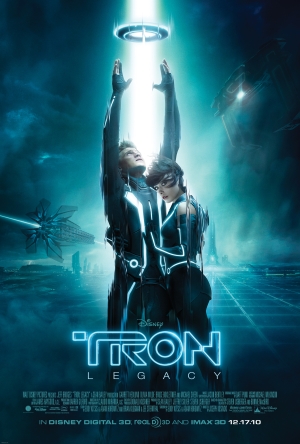 TRON: Legacy (2010)
TRON: Legacy (2010)
Directed by Joseph Kosinski. Starring Jeff Bridges, Garrett Hedlund, Olivia Wilde, Bruce Boxleitner, Michael Sheen.
Disney has sunk a hefty amount of money into the making and marketing of TRON: Legacy as a blockbuster and a future franchise. Given the long-term currency of the 1982 original, this is what you would expect. The IMAX 3D release that coincides with last year’s release of Avatar makes Disney’s scheme of conquest obvious.
And yet, after watching the film, I have to wonder if Disney had any idea what they were doing with this, uhm, strange and mostly airless film. It’s decked with gorgeous neon visuals and special effects, but it is neither an action extravaganza to grab the young viewers nor an intelligent enough follow-up to the heady ideas that TRON smashed around in 1982 at the edge of the computer revolution. It appears that the revolution has not been televised. Or not screened.
TRON: Legacy is no fiasco—it will make a profit and I imagine that international box-office will make up the significant part of it—but it’s only “adequate” all around. Considering that I went into the film with the realistic expectation that it might very well suck, I can say with enormous lack of passion that I am “satisfied.” However, this won’t be a film I’ll want to revisit the way I do its predecessor, nor will it make it onto my DVD shelf. The benefit of the IMAX 3D presentation is significant enough (see it in this format if you can) that my disappointment would increase in its absence.
As TRON: Legacy opens, starting with a beautiful “grid” re-visioning of the Sleeping Beauty Castle logo and then an electrifying credit sequence, the movie feels ready to deal with the “legacy” part of its title and address the changes in the computer world through the development of ENCOM, which Kevin Flynn (Jeff Bridges) seized in 1982. But in 1989, Flynn goes missing mysteriously while working on a project he felt might change the world. He also leaves behind a son, Sam Flynn, who chooses not to take an active interest in ENCOM. Moving forward to 2010, ENCOM has again turned into central-casting cold-hearted company run by a committee that has no interest in Kevin Flynn’s counter-culture, share-the-data approach. Only Flynn’s old partner (and Jeff Bridges’ heroic co-star from the first movie) Alan Bradley (Bruce Boxleitner) still defends Flynn’s legacy.
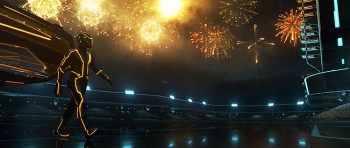 There’s is a taste of genuine exhilaration in these real-world scenes because you can see that this is indeed a sequel to TRON: Legacy and is trying to re-animate its themes of electronic freedom for the new millennium. However, almost all this is set-up that the rest of the film ignores. For example, one of the ENCOM executives is the wiz-kid son of Ed Dillinger, the first film’s villain. (Apparently, Dillinger didn’t go to jail when Bradley and Flynn exposed his outright corporate fraud. But he probably wouldn’t have gone to prison in the our world, so I guess that’s fine.) But “Son of Dillinger” doesn’t serve any purpose later in the story; he’s only dropped in as a head-nod for fans. I appreciate that the filmmakers are looking out for me—they include a few lines from the original as well that gave me a nice rush—but couldn’t they have carried it farther? And since an (uncredited) Cillian “Scarecrow” Murphy plays the part of Dillinger, it’s even more frustrating. This guy would have made an great follow-up to David Warner’s Sark. But this “Dillinger Jr.” problem is part of a larger one: ENCOM in truth has nothing to do with the rest of the story. Once Sam Flynn makes it into the grid, the company might as well not exist—there is no MCP who deals with both sides of the screen.
There’s is a taste of genuine exhilaration in these real-world scenes because you can see that this is indeed a sequel to TRON: Legacy and is trying to re-animate its themes of electronic freedom for the new millennium. However, almost all this is set-up that the rest of the film ignores. For example, one of the ENCOM executives is the wiz-kid son of Ed Dillinger, the first film’s villain. (Apparently, Dillinger didn’t go to jail when Bradley and Flynn exposed his outright corporate fraud. But he probably wouldn’t have gone to prison in the our world, so I guess that’s fine.) But “Son of Dillinger” doesn’t serve any purpose later in the story; he’s only dropped in as a head-nod for fans. I appreciate that the filmmakers are looking out for me—they include a few lines from the original as well that gave me a nice rush—but couldn’t they have carried it farther? And since an (uncredited) Cillian “Scarecrow” Murphy plays the part of Dillinger, it’s even more frustrating. This guy would have made an great follow-up to David Warner’s Sark. But this “Dillinger Jr.” problem is part of a larger one: ENCOM in truth has nothing to do with the rest of the story. Once Sam Flynn makes it into the grid, the company might as well not exist—there is no MCP who deals with both sides of the screen.
So what about this Sam Flynn fellow? Sam has some of the daredevil aspects of his father: He base jumps! He commits tech-sabotage using a video of his dog! But actor Garrett Hedlund is not up to the task of projecting the appropriate charisma, especially when he has to deal with Jeff Bridges himself playing not one but two roles. Hedlund is a bland lead, and when the film reaches the philosophical middle-stretch, he can’t carry his side of the story at all.
However, I’m leaping ahead.
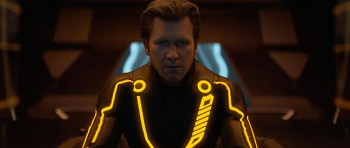 Sam stumbles onto a way into the grid, following after his father, and for about twenty minutes TRON: Legacy turns into the weird and wild science-fiction actioner the trailers promised. The disc combat in layers of glass cages is a solid thrill—although I feel an even bigger thrill is lurking inside the sequence that never got out. The new version of the lightcycle battle, where the vehicles use multiple levels across clear surfaces reminiscent of the multi-level chutes in a pinball game, is excellent. But I feel that too could have benefited from re-thinking it from the script perspective instead of keeping it in the VFX department to show off a pack of cool collisions and colors.
Sam stumbles onto a way into the grid, following after his father, and for about twenty minutes TRON: Legacy turns into the weird and wild science-fiction actioner the trailers promised. The disc combat in layers of glass cages is a solid thrill—although I feel an even bigger thrill is lurking inside the sequence that never got out. The new version of the lightcycle battle, where the vehicles use multiple levels across clear surfaces reminiscent of the multi-level chutes in a pinball game, is excellent. But I feel that too could have benefited from re-thinking it from the script perspective instead of keeping it in the VFX department to show off a pack of cool collisions and colors.
Then the middle of the movie begins and everything else stops. The core conflict is that Kevin Flynn attempted to create a perfect system from the grid, but his own program Clu (a digitally youthened Jeff Bridges) rebelled over an issue of an emerging grid life form and turned to genocide to wipe out perceived imperfections. (Apparently Clu’s original call letters were HAL.) The concept of these “isomorphic algorithms” (ISOs) that could provide the human race with an enormous leap forward is the film’s most significant bungle. There’s tremendous potential here, but it is treated in such an offhand, rote manner that not only does it hurt the theme of the movie, it undermines the forward momentum. I know what Clu wants to achieve, I know why it will have negative consequences, but I don’t have any overall concern about it. And Hedlund’s underwhelming acting won’t allow the father-son emotional connection overcome these plot problems.
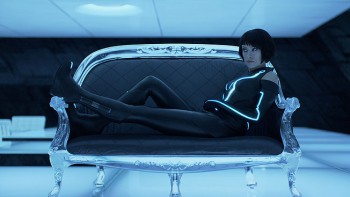
As the film struggles toward its conclusion, it at least trots out a last big piece of action, doing a sort of aerial lightcycle fight. But the elements that should make the climax afterwards powerful fail to come together. There’s a late revelation that should be a audience-zapper—but it has no build-up and the pay-off makes it seem like it was inserted as an afterthought. The beautiful figure of Quorra (Olivia Wilde) should deliver an emotional punch with her connection to Flynn’s grand plan for humanity, but the plan is so hashed out and Quorra’s co-star is Garrett Hedlund, and you already know how that affects everything. Olivia Wilde is excellent in her part, both alien and fresh in her behavior, so it’s a shame that it all comes to so little and she exists in a vacuum.
Ah, but at least we’ve got Jeff Bridges, who hits well with his dual roles. Clu isn’t as menacing a villain as the MCP, but Bridges has a haughty sneer in the part that does feel partially like an artificial creation. As Flynn, he’s got the groovy Zen lines and is a true continuation of the young man from 1982. He has to carry the clumsy exposition, but . . . hey, Jeff Bridges—I love him, you love him, here he is. Looking forward to True Grit.
Michael Sheen appears in a supporting role as the owner of the End of Line Club. Sheen seems to be attempting David Bowie playing a part in an adaptation of an unpublished Douglas Adam’s Hitchhiker’s Guide novel. Very little works in the sequence inside the club—which doesn’t look much different than the trendiest Vegas nightspots with $600 table service—so perhaps I am more willing to give Sheen the benefit of the doubt for being bizarrely entertaining even if it feels he’s completely off-script and the director didn’t bother to correct him.
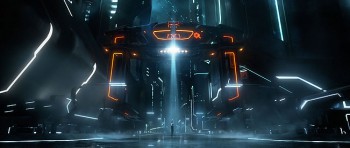 TRON: Legacy refuses to let viewers down with the look or the sound, and it seems that director Joseph Kosinski felt more at home putting together the visual and aural spectacular than he was handling story flow. I prefer the less realistic, flat and colorful design of the first movie, but the more dimensional black glass and neon design of Legacy is good eye-candy. Each moving part of it contains some surprise. I don’t understand why the Outlands look like normal geological rocks—no part of this world should appear “natural”—but that’s the only nit I have about the realization of a genuine fantasy setting stripped down to harsh, glowing beauty. The special effects are realized with similar imagination; the pixel-shatter motion for getting “derezzed” is impressive, no matter how many times the movie trots it out as flying discs and crashing vehicles rip programs apart.
TRON: Legacy refuses to let viewers down with the look or the sound, and it seems that director Joseph Kosinski felt more at home putting together the visual and aural spectacular than he was handling story flow. I prefer the less realistic, flat and colorful design of the first movie, but the more dimensional black glass and neon design of Legacy is good eye-candy. Each moving part of it contains some surprise. I don’t understand why the Outlands look like normal geological rocks—no part of this world should appear “natural”—but that’s the only nit I have about the realization of a genuine fantasy setting stripped down to harsh, glowing beauty. The special effects are realized with similar imagination; the pixel-shatter motion for getting “derezzed” is impressive, no matter how many times the movie trots it out as flying discs and crashing vehicles rip programs apart.
The score from French electronica musicians Thomas Bangalter and Guy-Manuel de Homem-Christo, under their performing name Daft Punk, is the finest music written for any movie this year. It has a lot to live up to in Wendy Carlos’s pioneering synth-and-orchestra score for TRON, but Daft Punk rises to the challenge with an epic work that weaves grand orchestral triumphs with dizzying synth-funks. It plays over many styles, but still holds together and becomes a driving engine for the film. It’s the best artistic work in the movie from anyone involved. (Carlos’s theme from TRON appears once, as something Kevin Flynn hums to amuse his young son.)
Ultimately, TRON: Legacy cannot escape the damning comparison to the first film. What’s strange is that this comparison is unrelated to what a viewer thinks about the 1982 film. Whether you love or hate the first movie (or only know it through reputation and clips), TRON: Legacy still feels like it has failed on a cultural promise. TRON, whatever your opinion of its entertainment value, was unique, strange, and wired right into its time period in a way that wouldn’t be obvious until years later. It stands out. TRON: Legacy is merely one more modern VFX spectacle with an adequate-to-underwritten story that spouts an interesting look, but there’s at least three or four other films each year about which you could say the same thing. That is not good enough, and for TRON: Legacy to have any legacy of its own, it needed to be a far sight better than “good enough.”
I am glad that TRON: Legacy exists as a reference to one of my favorite movies. I did not expect to love it, and I didn’t.
END OF LINE
The original Tron was a bit before my time, but I did see it on video once or twice. I loved it, and as a video game fan I do think that film spoke to the 80s generation of arcade dwellers and computer programmers. Tron: Legacy looks like a good flick for movie night, but I don’t see how it will make an actual connection with viewers today.
Agreed, Olivia Wilde was great in her role. Seriously though, you enjoyed Jeff Bridges? I really believe he was bad in both movies. I felt he was trying to be Han Solo in the first, but Flynn isn’t Han and the edgy fringe of the law quality he was after turned up goofy. I also didn’t understand his ‘Zen’ thing which I thought wasn’t acted well either, and anything CLU did was just delivering lines since it was all digital. In 82 Flynn was a hacker, a programmer who made video games on the cutting edge of technology, not a hippie. He just wants his money, a more yuppie point of view as the 80s came into full bloom. I felt like someone mis-translated young Flynn’s ‘Hey man’ lines from what they were, cocky slang, to ‘Hey man, pass the weed’ which couldn’t have been further from the truth. Did you see any of that?
“… mostly airless film.”
Couldn’t agree more, and I’m referring to the original only at this point, though I take your word on the redux Disney seemed to think was a good idea in 2010. At the time of the original, such effects were prevalent only in Star Wars, so we were all eager to see more. Even then, there was very little story, and the movie added to the growing cliche of ‘All Effects, Anemic Story.’
Avatar is another of these, imo.
Effects without a compelling story fall short, every time.
George Lucas got that part right on most of the Wars, anyway. And Peter Jackson had all the story of Middle Earth to pull from thanks to Tolkien, and wisely made good use of it.
I agree with you, especially about Daft Punk, that score deserved a better film.
It felt to me like there were at least three scripts which were cut up to make this one. As a result no one story got told completely.